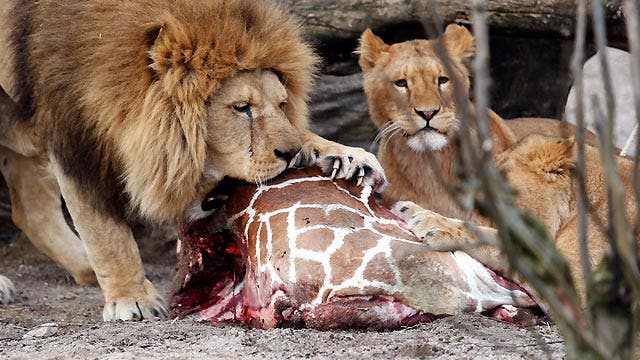Not again!
Despite the death threats and worldwide disgust when the Copenhagen Zoo in Denmark killed 2-year-old giraffe Marius to prevent inbreeding on Sunday, Feb. 9, a second zoo in the country plans to kill a giraffe -- and says it’s in the animal’s best interest.
The second giraffe, coincidentally also named Marius, lives at the Danish Jyllands Park Zoo. To make room for a female giraffe it plans to acquire, the zoo plans to put down its 7-year-old male, balancing out genders in the facility.
[sidebar]
“We can't have two males and one female. Then there will be fights,” zoo keeper Janni Lojtved Poulsen told Danish news agency Ritzau. “If the breeding program coordinator decides that he should be put down, then that's what we'll do,” Poulsen said.
The first Marius was killed because his genes were already well represented in the European Association of Zoos and Aquaria, which aims to maintain biodiversity and didn’t want an excess of similar genes. Despite an online petition arguing that the zoo should spare his life, Marius was shot in the head -- according to European zoo-keeping guidelines -- before being butchered and fed to lions.
Will the second Marius face a similar fate? It might be possible for the zoo to find another place for the giraffe to live, Reuters reported, but the probability of that is small. Like the first Marius, the Jyllands Park giraffe is considered unsuitable for breeding.
Poulsen defended the zoo’s plans, despite the widespread disgust of animal lovers.
“Many places abroad where they do not do this, the animals live under poor conditions, and they are not allowed to breed either. We don't think that's OK,” she said.
[pullquote]
The Jyllands Park Zoo has not said whether it will have a public dissection of its Marius similar to the one held at the Copenhagen Zoo.
The watchdog group Animal Rights Sweden said the plight of Marius underscores what it believes zoos do to animals regularly.
"It is no secret that animals are killed when there is no longer space, or if the animals don't have genes that are interesting enough," the group said in a statement. "The only way to stop this is to not visit zoos."
"When the cute animal babies that attract visitors grow up, they are not as interesting anymore.”





















